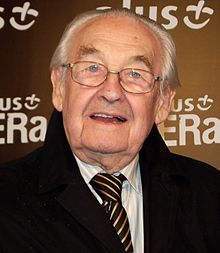Three War Films
| Andrzej Wajda | |
|---|---|

Wajda in 2012
|
|
| Born |
Andrzej Witold Wajda 6 March 1926 Suwałki, Second Polish Republic |
| Died | 9 October 2016 (aged 90) Warsaw, Poland |
| Cause of death | Pulmonary failure |
| Alma mater | National Film School in Łódź |
| Occupation | Film director, producer, screenwriter |
| Years active | 1951–2016 |
| Spouse(s) |
|
| Awards | |
Andrzej Witold Wajda (Polish: [ˈandʐɛj ˈvajda]; 6 March 1926 – 9 October 2016) was a Polish film and theatre director. Recipient of an Honorary Oscar, the Palme d'Or, as well as Honorary Golden Lion and Golden Bear Awards, he was a prominent member of the "Polish Film School". He was known especially for his trilogy of war films consisting of A Generation (1954), Kanał (1956) and Ashes and Diamonds (1958).
He is considered one of the world's most renowned filmmakers whose works chronicled his native country's political and social evolution and dealt with the myths of Polish national identity offering insightful analyses of the universal element of the Polish experience - the struggle to maintain dignity under the most trying circumstances.
Four of his films have been nominated for the Academy Award for Best Foreign Language Film: The Promised Land (1975),The Maids of Wilko (1979),Man of Iron (1981) and Katyń (2007).
Wajda was born in Suwałki, Poland, the son of Aniela (née Białowąs), a school teacher, and Jakub Wajda, an army officer. Wajda's father was murdered by the Soviets in 1940 in what came to be known as the Katyn massacre. In 1942 he joined the Polish resistance and served in the Home Army. After the war, he studied to be a painter at Kraków's Academy of Fine Arts before entering the Łódź Film School.
...
Wikipedia
